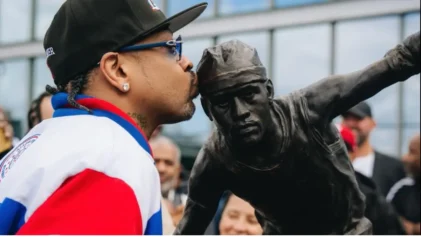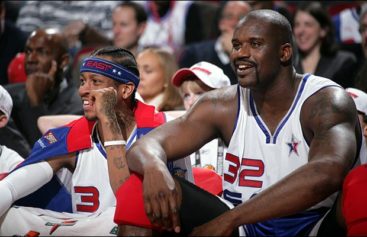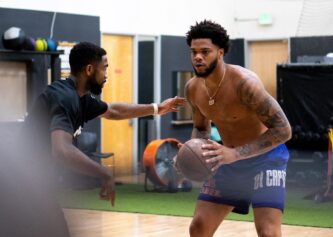Allen Iverson had not played in the NBA for three years, but he officially retired from the league Wednesday as perhaps the best “pound-for-pound” player in its history.
That’s what LeBron James said about the 5-foot-10 former point guard and ex-NBA MVP with the Philadelphia 76ers. And many agree. The diminutive Iverson was a lightning rod on and off the court, for his exhilarating play and sometimes-questionable behavior.
Always, Iverson entertained.
“I gave everything I had to basketball,” he said at Philadelphia’s Wells Fargo Center. “The passion is still there but the desire to play is not. It was a great ride.”
Listed at 6-feet but more like 5-foot-10, Iverson became a sort of hip-hop icon while flourishing in mercurial fashion on the court, sporting ever-present cornrows and myriad tattoos that made colorful his slight body.
Earlier this week, James complimented Iverson for his skill and toughness and said he influenced the NBA culture as a young and hip league. Iverson said he did so at a price.
“I took an ass kicking for me being me in my career,” he said. “For me looking the way I look and me dressing the way I dress. It was just being me. Now, look around, now all of the guys in the NBA have tattoos. You used to think the suspect was the guy with the cornrows. Now you see the police officers with the cornrows. I took a beating for those type of things and I’m proud to say I changed a lot with this culture and this game.”
Reports have been rampant that Iverson, 38, has blown much or all of the $200 million he earned in salary and endorsements in his 14-year career. He said it has pained him to read the reports.
“It does bother me, I have a heart just like everybody else,” Iverson said. “People have encouraged me to [publicly] address those issues. But if I know and my family knows and people that are close to me know, why do I have to explain myself? It’s hard having rhino skin sometimes. . . A negative story about Allen Iverson is going to sell regardless. Nobody wants to talk about what I do for [charities]. That’s how this world is.”
Iverson’s world in Philadelphia was electric. He won the NBA’s MVP Award and led the Sixers to the 2001 NBA Finals, losing the Los Angeles Lakers. But getting the 76ers there was a testament to Iverson’s will and skill.
He made 11 NBA All-Star teams and four times was the league’s top scorer. But for all he achieved on the court, he had enough blow ups with coaches or the media that those episodes will forever be a part of his legacy. Particularly, his rant in 2002 that seemed to minimize the value of practice remains one of sports television’s most memorable sound bites.
“It wasn’t just about that I didn’t like practice or care about practice or anything like that,” Iverson said. “If I could go back and do it all over again, I would never have done the interview. As far as how I expressed practice, practice, practice over and over again, I wouldn’t take that back. That sound bite — because it’s great for the media and great for the fans, they love it — but they had no idea my best friend just got killed. They had no idea that press conference wasn’t about practice, it was about me not being traded from Philadelphia. That’s what I thought I was at that podium to talk about.”
Iverson said he is unclear about what the future holds. He is working on a documentary about his life and has been doing speaking engagements, most recently to players at Southern Methodist University in Dallas, where former 76ers coach Larry Brown now works.
Later this season, the team plans to the retirement of Iverson’s No. 3 jersey. He played parts of 12 seasons in Philadelphia after being selected with the No. 1 overall pick in the 1996 draft.
Iverson said he’ll be a Sixer “until the day I die. . . I promise you, it is a happy day for me,” he said. “I thought this day would be a tough day, but it’s a happy day.”


